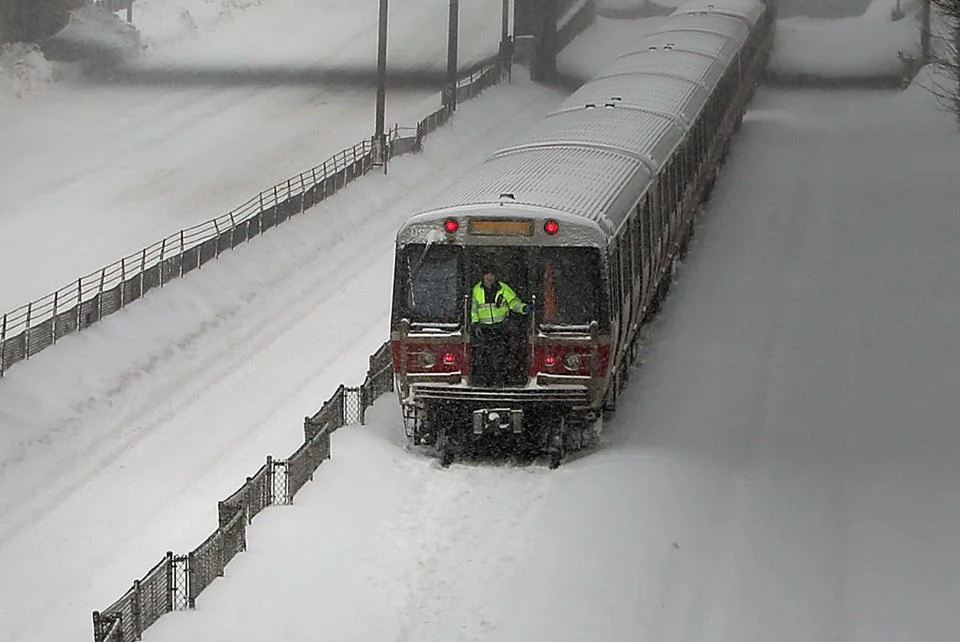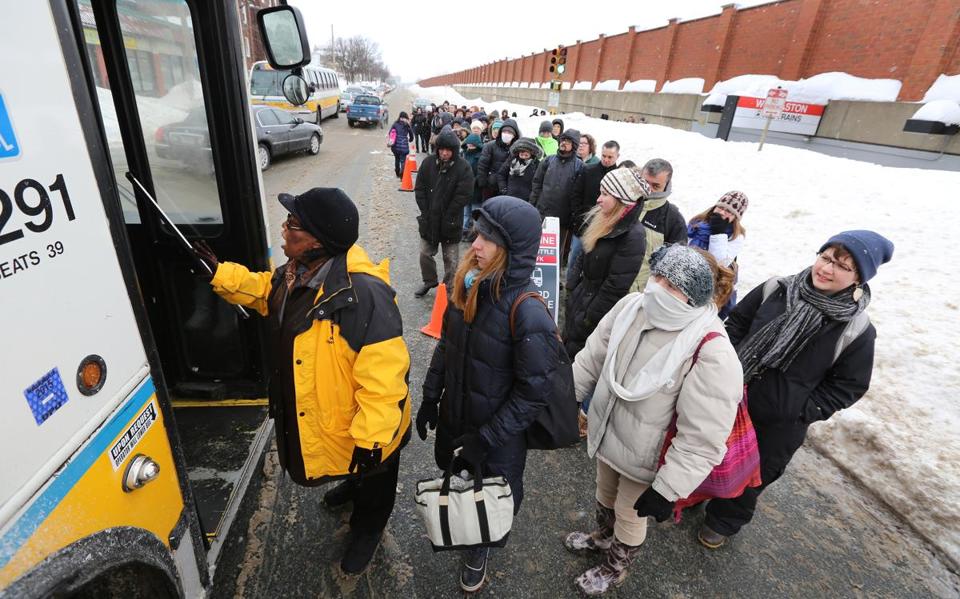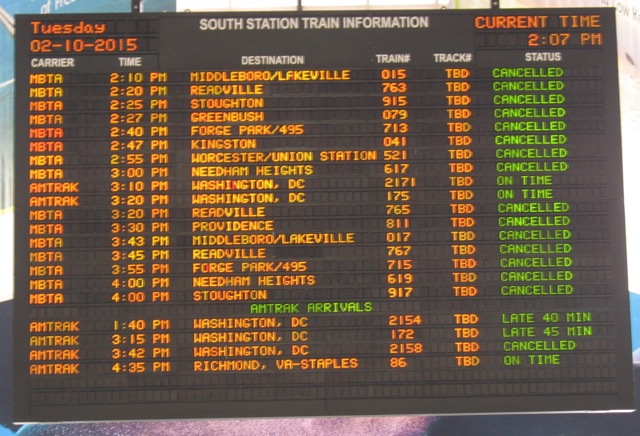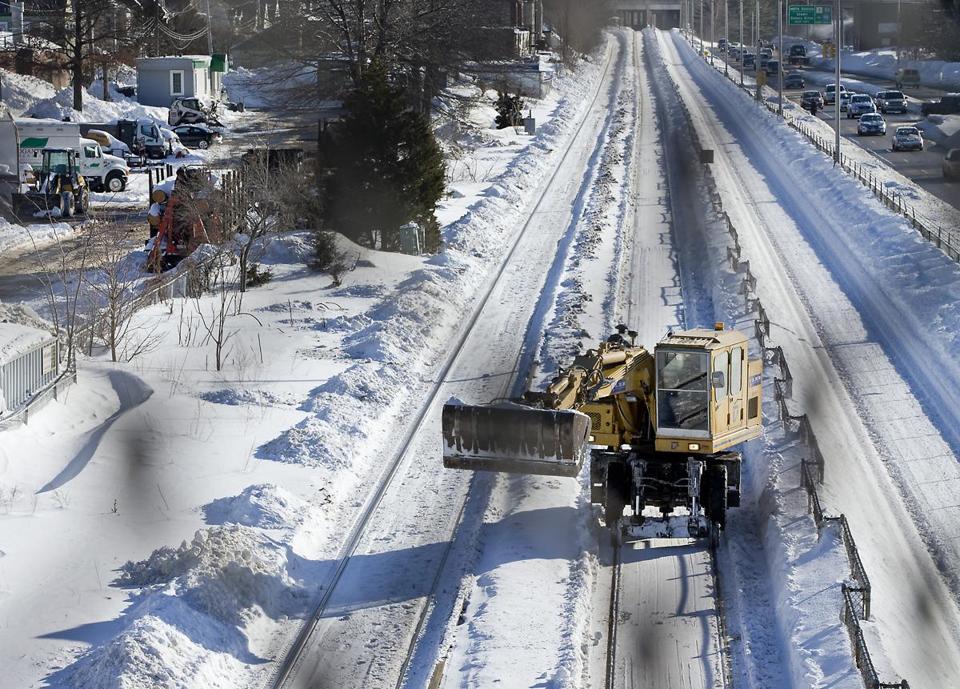
An Emergency Transportation Plan to Fix Boston's Transit Crisis
Yesterday we learned that due to decades of neglect the MBTA will need at least 30 days to restore service to the normal level of delays, signal problems and disabled trains we're used to. While there is plenty of blame to go around, right now we must focus on the current emergency.
Yesterday we learned that due to decades of neglect the MBTA will need at least 30 days to restore service to the normal level of delays, signal problems and disabled trains we're used to. While there is plenty of blame to go around, right now we must focus on the current emergency.




We must act quickly to implement a temporary transit network that would people to resume their lives before the state's economy collapses and half the city's population is out of work. Mayor Walsh and MBTA General Manager Beverly Scott should seek help from cities and transit agencies who have experience with natural disasters. With bold political leadership and around 1,000 buses from across the northeast we can put an emergency transportation plan into action.
For guidance we should look to MTA New York City Transit, which in 2012 implemented emergency "bus bridges" connecting Brooklyn and Manhattan two days after Hurricane Sandy knocked out all subway service in the city's core (photos). The city used simple cones to create dedicated bus lanes along the shuttle route and police officers to enforce the lanes and keep over 200 buses moving on each route. MTA also ran a long-term shuttle route to replace the A line in Queens and a year earlier replaced suspended commuter rail service after Hurricane Irene.
Here and now, a network of emergency shuttle bus routes must be created based roughly on known travel patterns. Bus routes would not exactly mimic subway corridors but they would get you into the city's core where you can walk or use what's left of the T. Some routes would use dedicated bus lanes and receive priority over all other traffic, with police enforcement, while other corridors would be open only to buses. For all of the issues with bus service, the MBTA does a great job running shuttle bus links such as Harvard-Alewife and Lechmere-North Station when things are planned in advance.
Cars carrying fewer than 3 occupants would be prohibited from entering the city or using major highways inside Route 128. Slug lanes would allow those who must drive from suburban areas to pickup additional passengers before continuing on. Large parking lots along I-495 and Route 128 can be turned into park-and-ride lots with bus shuttles operating in dedicated bus lanes on all major highways.
Bikes must be part of the solution. It is certainly cold outside but desperate times call for desperate measures. Better to ride 3 miles in the cold than wait for a bus in the cold for the same 15 minutes, and every 50 bikes represents one more bus available elsewhere. Designating corridors like Washington St, Massachusetts Ave, Huntington St and Commonwealth Ave for buses and bicycles only would enable reasonably fast limited-stop bus service while giving people people a safe place to ride. Secure bicycle parking tents can be setup in several downtown locations and an emergency ordinance could require most office buildings to allow bikes inside until full subway service resumes.
Walking should be encouraged whenever possible in order to minimize stress on the transit system. Bostonians have not experienced a transit strike in recent decades but experience from other cities shows people will gladly walk a few miles if they can. Currently our sidewalks are a treacherous mix of snow and ice, so vehicle lanes can be converted to pedestrian lanes until sidewalks are clear, with some key roads open to buses and pedestrians only.
Some of these measures may sound extreme, but desperate times call for desperate measures, and I believe even the harshest critics of transit would be surprised by how well the city would function if they would just allow a demonstration.
At the very least, this plan would prevent the total collapse of the region and it is our chance to show definitively that a fast, frequent and comprehensive transit network is invaluable to the entire region. Eventually we'll wonder how we ever lived without one.
Podcast 02 - Urban truck & bus safety, too much free parking
Transportation researcher Alex Epstein shares his latest work improving safety around trucks and buses. We focus on education/training, visibility and equipment such as mirrors and side guards. Ask your city, transit agency or delivery company what they are doing to prevent fatalities.
More after the break...
Transportation researcher Alex Epstein shares his latest work improving safety around trucks and buses. We focus on education/training, visibility and equipment such as mirrors and side guards. Ask your city, transit agency or delivery company what they are doing to prevent fatalities.
Be sure to review what bicyclists can do to establish your presence and prevent collisions with trucks and buses (and cars). For more on safe bike driving listen to Critical Transit 39 with cycling instructor Keri Caffrey. Other links include the Livable Streets Alliance, MassBike, Boston Cyclists Union and Somerville Bicycle Committee (which Alex currently chairs).
Car parking has been in the news recently: specifically, too much free parking, though that's not how it's covered. We have so many cars that a new app lets drivers sell public parking spaces when they leave and Mayor Walsh isn't too happy about it. Meanwhile, free or cheap parking is the number one factor in choosing driving over other modes and the rest of us pay the very high costs of so many cars on our streets. If this sounds crazy to you -- how could there be too many parking spaces? -- see The High Cost of Free Parking.
We finish with an excellent listener feedback on Bridj and some of the Green Line issues discussed in the first episode.
Finally, a very happy birthday to the MBTA (pdf). It's 50 years old!
UPDATE: terrific perspective on the MBTA vision (or lack thereof) at this moment.
The Transit Matters Podcast is your biweekly source for transportation news, analysis, interviews and more. We focus on sustainable transportation planning, operations and policies in Boston and beyond, and we do it in the average commute time. Read more about the podcast and send us your questions, comments and ideas for topics or guests >> contact us.
Like this podcast? Share it around, tell your friends and colleagues, and subscribe to the RSS feed to be notified of new posts and episodes.
Share your thoughts on anything we discussed in the comments below.
Categories
- Children (1)
- Diversions (1)
- Olympics (1)
- MAPC (2)
- Red–Blue Connector (2)
- Urban Design (3)
- Bus (4)
- Fares (4)
- Late Night Service (4)
- MBTA ROC (4)
- Silver Line (4)
- Snow (5)
- Blue Line (8)
- Emergency (8)
- Orange Line (8)
- Public Comment (8)
- Maintenance (9)
- Operations (9)
- Signage (9)
- Fare Collection (10)
- Labs (11)
- Safety (11)
- Planning (12)
- Communication (14)
- MBCR (14)
- MassDOT (14)
- Green Line (16)
- History & Culture (16)
- Red Line (18)
- MBTA Bus (21)
- Commuter Rail (24)
- Advocacy (26)
- Capital Construction (28)
- Politics (30)
- Podcast (35)
- News (38)
- Media (40)
- Funding (42)
- Statements (50)
- MBTA (57)

